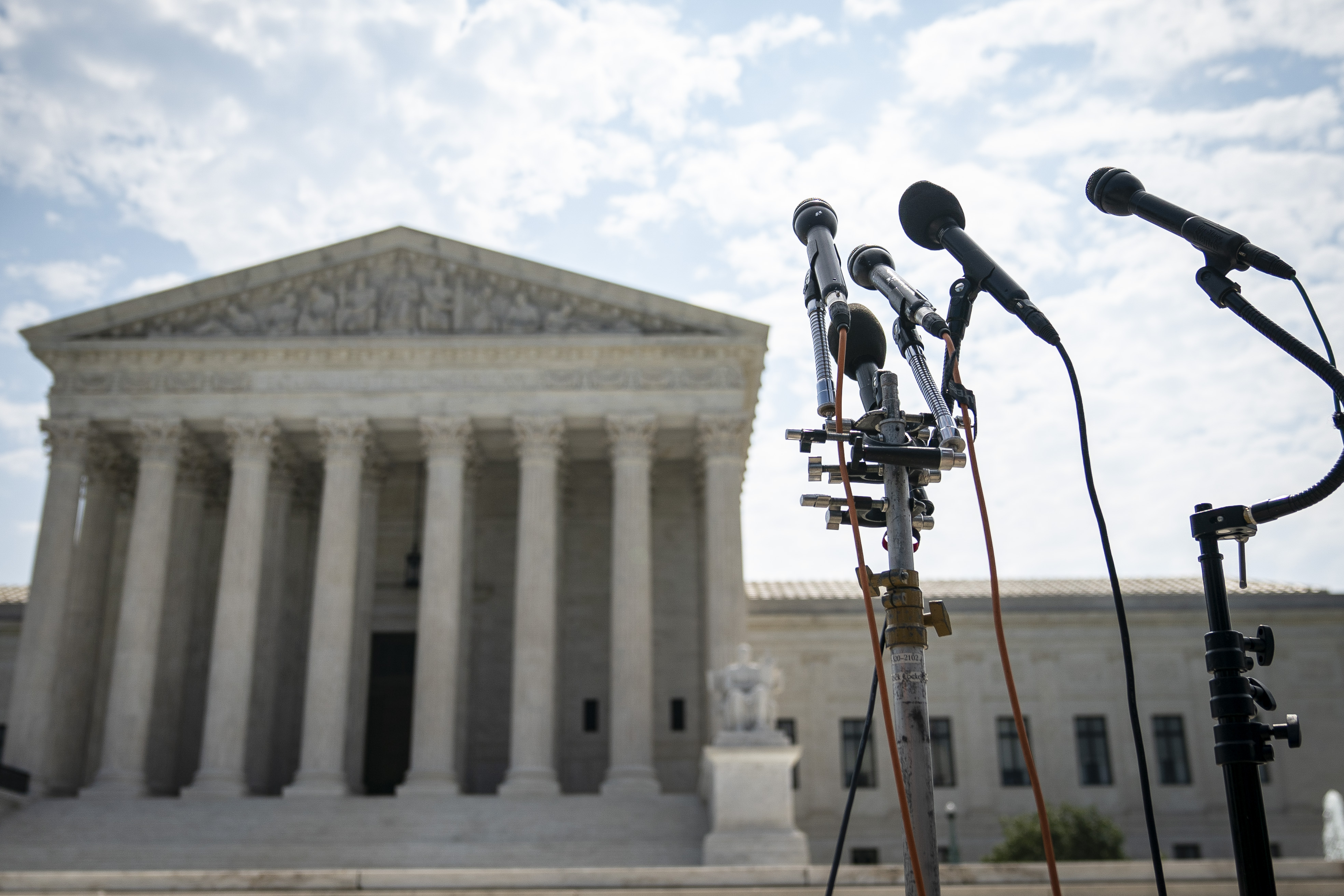Law professor John Aloysius Cogan Jr. is a health insurance expert and Roger S. Baldwin Scholar at the UConn School of Law, who focuses his research and teaching on health care organizations and finance, health law and policy, federal health programs, health care fraud and abuse, and health insurance law. He has written scholarly articles on a wide range of health insurance topics, including the Affordable Care Act and the Health Insurance Portability and Accountability Act, otherwise known as HIPAA.
Today the Supreme Court of the United States will hear arguments in California v. Texas. The plaintiffs in the case are asking the Court to invalidate the Affordable Care Act (ACA). In a new article to be published in the Boston College Law Review later this month, Cogan argues that the Affordable Care Act should remain intact because two statutes passed by Congress earlier this year, the Families First Coronavirus Relief Act (FFCRA) and the Coronavirus Aid, Relief and Economic Security (CARES) Act, demonstrate that Congress wants to keep the ACA intact. The two statutes use the ACA to provide coronavirus-related health care relief to millions of Americans. He discussed his article with UConn Today.
In California v. Texas, the Supreme Court will focus on whether Congress intends the Affordable Care Act to continue. Your paper in the Boston College Law Review says this issue was settled by Congress earlier this year. What are the grounds for this filing and how did you stake out your position after evaluating it?
To understand this lawsuit you have to go back to 2012 and the first Affordable Care Act case that went before the Supreme Court, which was called NIFB v. Sebelius. In that case, the plaintiffs argued that the individual mandate — the requirement that you had to buy health insurance — was unconstitutional. The Supreme Court found the mandate constitutional under the Congress’s constitutional taxing power because the mandate included a penalty. Americans who didn’t buy the insurance had to pay a penalty. Since the penalty would generate revenue for the government, the Court said it was like a tax. Therefore, it was authorized under the Constitution’s taxing clause.
Fast-forward five years to when Congress got rid of the penalty for the mandate. In 2017 Congress passed a law that reduced the mandate penalty to zero dollars, but left the mandate in place. The people who oppose the Affordable Care Act remembered the 2012 case and immediately filed suit, arguing that the mandate was unconstitutional because its penalty was no longer a tax. But they did not stop there. They then argued that the entire ACA should be struck down. They argued that the mandate could not be severed from from the rest of the ACA because Congress believes the mandate is so essential to the entire ACA. There’s one provision in the ACA that uses the term “essential” when talking about the mandate and its relationship to the ACA. The district court in Texas agreed. It ruled that the mandate was unconstitutional and then turned around and struck down the entire ACA in late 2018.
Last March, when the coronavirus was erupting, Congress turned around and passed several coronavirus relief statutes, two of which are the FFCRA and the CARES Act. Together, those two statutes provide Americans with near-universal coverage for coronavirus testing and provide cost-free access to coronavirus vaccination for many Americans. In order to provide those benefits, Congress used the ACA. The ACA is the foundation for many of the health benefits provided by those two statutes. This created a conflict. On the one hand we have a federal court saying, no, the ACA is no good, that’s what Congress wanted. On the other hand, in 2020, you’ve got Congress actually using the ACA to respond to the coronavirus. This suggests that Congress wants the ACA to stand.
The plaintiffs argued that the mandate is unconstitutional, but cannot be severed from the Affordable Care Act, therefore the whole ACA must be struck down. You say that’s not the case.
Yes. I argue in my article that when Congress passed the FFCRA and the CARES Act, it knew that two federal courts had already ruled the mandate unconstitutional. So in their mind, the mandate was severable from the rest of the ACA. Congress simply said, fine, I’m going to go ahead and pass FFCRA and the CARES Act—which depend heavily on the ACA—even though the mandate is unconstitutional. That’s pretty rock solid evidence that the mandate is not inseverable from the rest of the ACA.
The Supreme Court will decide to hear (or not hear) a case for various reasons. It does not have to articulate why. If the Court knows it has already addressed an issue previously—like the constitutionality of the ACA’s mandate—why would the Court want to consider it again?
That’s a great question. A lot of what the Supreme Court does is behind closed doors, so we’ll never really know what their thinking was. But when it comes to accepting a case only four justices need to vote to accept the case, only four out of the nine. In this case there were at least four justices who agreed to accept the case. It could have been the four liberal justices decided to have the Supreme Court end this matter and uphold the ACA or it could have been four conservative justices wanted to strike down the ACA. It could have been some mix. We just don’t know, but it’s a fairly important case so it’s not surprising the Supreme Court agreed to hear the case.
Why did you take the opportunity to really dive into this and examine the behind the scenes statutes and how they might be applied?
I became interested in this case because I was intrigued by the arguments of the two parties. The folks opposing the ACA were arguing that Congress intended one thing and were looking at the text of the Affordable Care Act from 2010. The defenders of the ACA argued that Congress intended something else and they were looking at the 2017 law that got rid of the mandate, but left the ACA intact. It seemed odd to me because I knew that these two coronavirus response statutes, the FFCRA and the CARES Act, had referenced the ACA. I immediately dove into those two statutes to understand how often they cited the ACA, as well as the kind and quality of those references. I was shocked to find out how often and how deeply those two statutes both cited and relied upon, the ACA.
Is it unusual for Congress to go back and change something in a piece of legislation that may have legal change implications?
No, not really. Congress frequently overrides judicial decisions. When a court says a statute means one thing, Congress can turn around and say, no, you’re wrong; this is what the statute means. It’s called an override, but it’s not the same thing as another court overruling a decision. It doesn’t change the decision. It’s really something along the lines of a superseding instruction to courts as to what a statute really means. We want Congress to do this because it supports the democratic process. Congress is the body that makes the laws, sets public policy, and enacts statutes. Courts are only supposed to interpret and apply those statutes. Congress answers to voters. The courts do not. We want Congress to step in and correct the courts when they need to, because that really supports the democratic process. If people don’t like what Congress is doing, they can vote out members of Congress, but if we don’t like what the courts are doing, we can’t vote out judges.
If the Supreme Court agrees with the plaintiffs and strikes down the ACA, what will that mean for Congress’s ability to make these kinds of changes?
This will be a problem for the democratic process, but not a surprise. Congressional overrides are hard to spot. There have been a number of empirical studies about Congressional overrides and the researchers have all come to the same conclusion — overrides are hard to identify. One reasons is that Congress often doesn’t expressly identify a statute as an override. Sometimes they do, but a lot of times they don’t. Even when they do identify a statute as an override, they don’t say so directly in the statute; they say it in committee reports or other official documents that are not often read. That’s one reason why some scholars now argue that Congress needs to come right out and say—right in the text of the statute—that it is an override. Whether Congress will do that or not remains to be seen. In this particular case, if the court strikes down the ACA, I think it’ll be one of many examples where the courts simply miss an override. Congress gave no indication in the text of the statutes or in any committee reports that FFCRA or the CARES Act were overrides. In addition, California v. Texas was already before the Supreme Court when these two statutes were passed. Neither the parties nor the Court had time to consider the effect of the two new statutes on the case.
What is the significance of having a commentary and an analysis of a case like this in a law review?
Law reviews are the main venue for publishing the research of law professors. Law professors do write books and publish in various other types of academic journals, but law reviews are the main landing spot for legal research and this piece is purely legal research. It goes through the several statutes — Affordable Care Act, CARES Act, Families First Coronavirus Response Act– and it looks at the Congressional override doctrine and existing cases and comes to a conclusion, after all that analysis, about what the outcome should be.
What significance will your article have for Court observers who see a scholar weighing in on an active case?
I hope the article will have an impact on the outcome of the case. I know that the parties are aware of the article. Whether they raise it during the arguments, we will have to wait and see. The conclusions that I’ve come to are pretty shocking to most people. I found that the two statutes cited, applied, or extended the Affordable Care Act more than 20 different times. This is really a pretty strong argument that Congress wanted to keep the ACA in place.
What else should people know about this case that will help them understand what does or does not happen?
I think people need to understand a couple of things about Affordable Care Act litigation. First, it’s not going away. This will not be the last ACA case. People are going to continue challenging the ACA in court. The ACA is not a perfect statute. It does a lot of good, but it also has a lot of parts that don’t work so well. Also, a lot of people really hate the ACA and want it gone. I think it’s going to be years before we ever see the end of the ACA litigation.
The second thing for people to remember is that ACA litigation involves a lot of inside baseball terminology and procedure. In other words, it’s highly technical. This particular case has to do with a unique ruling by the Supreme Court in 2012, as that ruling affects a statute from 2017, which affects one single piece of the ACA, and then turns on a legal principle called the severability doctrine, which is then is affected by two more statutes passed in 2020. This is a level of complication that most people not only don’t understand, but don’t want to understand. They’ve got better things to do than to try to figure out what’s going on in this case. I think when we get down to litigation at this sort of level, dealing with a statute that affects hundreds of millions of people, it’s really time to rethink how we provide health care in this country.



